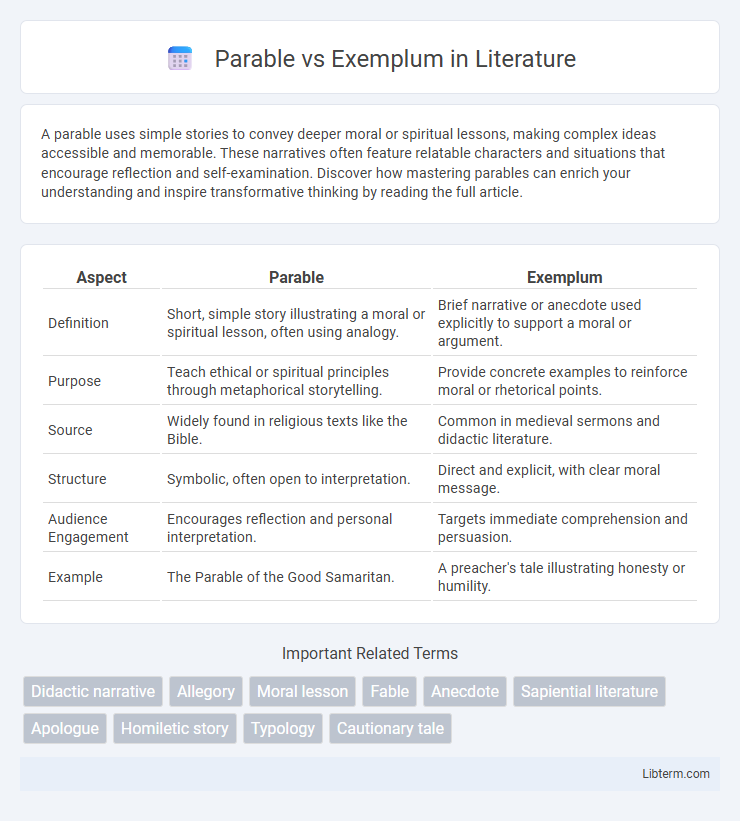A parable uses simple stories to convey deeper moral or spiritual lessons, making complex ideas accessible and memorable. These narratives often feature relatable characters and situations that encourage reflection and self-examination. Discover how mastering parables can enrich your understanding and inspire transformative thinking by reading the full article.
Table of Comparison
| Aspect | Parable | Exemplum |
|---|---|---|
| Definition | Short, simple story illustrating a moral or spiritual lesson, often using analogy. | Brief narrative or anecdote used explicitly to support a moral or argument. |
| Purpose | Teach ethical or spiritual principles through metaphorical storytelling. | Provide concrete examples to reinforce moral or rhetorical points. |
| Source | Widely found in religious texts like the Bible. | Common in medieval sermons and didactic literature. |
| Structure | Symbolic, often open to interpretation. | Direct and explicit, with clear moral message. |
| Audience Engagement | Encourages reflection and personal interpretation. | Targets immediate comprehension and persuasion. |
| Example | The Parable of the Good Samaritan. | A preacher's tale illustrating honesty or humility. |
Introduction to Parable and Exemplum
Parables and exempla are concise narrative forms used to convey moral or spiritual lessons through storytelling. A parable is a simple story, often with a single metaphorical meaning, commonly found in religious texts like the Bible, designed to illustrate a universal ethical principle. Exempla are anecdotal examples or brief stories used primarily in medieval sermons to support a moral argument or doctrine, often drawn from historical or legendary sources.
Definition of Parable
A parable is a succinct narrative designed to convey a moral or spiritual lesson through symbolic representation, often featuring human characters and realistic scenarios. It differs from an exemplum, which is a brief anecdote used primarily in medieval rhetoric to illustrate a specific point or argument. Parables employ metaphorical storytelling to evoke introspection and ethical understanding, making them a powerful tool in religious and philosophical teachings.
Definition of Exemplum
An exemplum is a short narrative or anecdote used to illustrate a moral or religious lesson, often employed in medieval sermons to make abstract principles tangible and relatable. Unlike parables, which are typically allegorical and fictional stories conveying broader spiritual truths, exempla rely on concrete examples or real-life occurrences to reinforce the preacher's message. The use of exemplum enhances persuasion and clarity by providing specific, memorable instances that embody the intended ethical or doctrinal teaching.
Origins and Historical Context
Parables originated primarily in religious and philosophical traditions, with many found in ancient scriptures like the Bible, aiming to convey moral or spiritual lessons through simple, relatable narratives. Exempla, emerging in medieval Europe, were commonly used by preachers and scholars to illustrate ethical points or theological concepts through real-life anecdotes or fabricated stories. While parables typically rely on allegory to teach universal truths, exempla functioned as practical examples grounded in contemporary social or religious contexts to persuade or instruct audiences.
Core Characteristics of Parables
Parables are concise, allegorical stories that use everyday events and characters to convey moral or spiritual lessons, often emphasizing a single, clear message. They rely on symbolic representation and open-ended interpretation, encouraging reflection and personal insight. Unlike exempla, which are straightforward examples illustrating a point, parables engage listeners through metaphor and narrative ambiguity.
Key Features of Exempla
Exempla are short, illustrative stories used primarily in medieval sermons to support moral or religious lessons, characterized by their practical, straightforward nature and vivid detail. Unlike parables, which are often metaphorical and open to interpretation, exempla provide clear, concrete examples drawn from everyday life, history, or legend to reinforce a specific point. The key features of exempla include their didactic purpose, narrative brevity, and reliance on memorable, relatable incidents that directly illustrate ethical teachings.
Purposes and Functions Compared
Parables serve primarily to illustrate moral or spiritual lessons through simple, relatable stories, often leaving interpretation open to provoke reflection and insight. Exempla function as concrete examples or anecdotes used by preachers or writers to reinforce doctrinal points, clarify complex ideas, or persuade an audience by appealing to practical experience. While parables invite contemplation and personal interpretation, exempla provide explicit evidence to support ethical teachings or arguments.
Notable Examples of Parables
Notable examples of parables include the Parable of the Good Samaritan, which teaches compassion across cultural boundaries, and the Parable of the Prodigal Son, illustrating forgiveness and redemption. Jesus's parables, such as the Parable of the Sower, use simple stories with profound moral lessons to convey spiritual truths. Unlike exempla, which are brief moral anecdotes often used in medieval sermons, parables typically present complex narratives with allegorical meanings to provoke reflection.
Famous Exempla in Literature
Famous exempla in literature, such as Chaucer's "The Pardoner's Tale" and Boccaccio's "Decameron," serve as moral anecdotes that illustrate specific ethical lessons through vivid storytelling. Exempla differ from parables by offering concrete, often historical or plausible events rather than allegorical narratives, making them practical tools for persuasion in medieval sermons and literature. These exempla remain critical in studying medieval rhetoric and moral instruction, showcasing the enduring impact of narrative examples on Western literary traditions.
Parable vs Exemplum: Key Differences and Similarities
Parables and exempla both convey moral or spiritual lessons through storytelling, but parables are simple, allegorical stories often found in religious texts, while exempla are brief, illustrative anecdotes used primarily in medieval sermons. Parables use metaphorical narratives to illustrate abstract principles or ethical teachings, whereas exempla rely on concrete examples and real-life situations to persuade or instruct an audience. Both forms aim to engage listeners and promote reflection, yet parables tend to emphasize universal truths, while exempla focus on practical application and reinforcement of doctrine.
Parable Infographic

 libterm.com
libterm.com